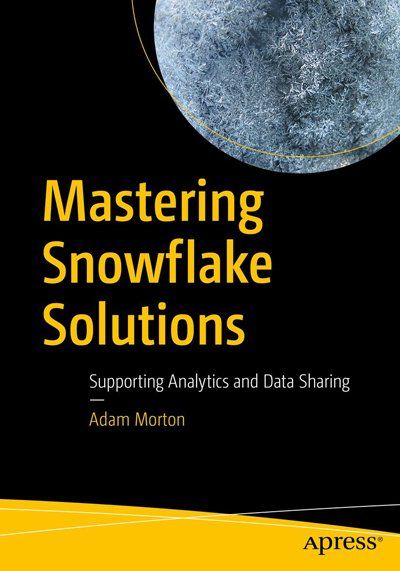TRAINING
We offer specialised training courses that help data and analytics professionals upskill with the knowledge they need to to excel in their roles. The two course favourites are our Mastering Snowflake program and our DCAM Data Governance course.
Mastering Snowflake
Grow your skills and fulfil your career potential by becoming an expert in the fastest growing cloud database product, Snowflake. This course is focused on data engineers, BI developers and solution architects, who have been working with on premise, legacy databases.
What will the members learn?
Members on the Mastering Snowflake program will be provided with all the tools and support they need to prepare them to work confidently in the cloud with Snowflake. This program isn’t just about theory, it’s about taking a deep-dive into the complex real-world challenges of data in the modern age and how you overcome them!
Exclusive course material and roadmap
The Mastering Snowflake Program includes:
In this training program you will be provided with Adam Morton;s Everest roadmap to guide you through a journey of transformation and application of real-word techniques to become an expert in the Snowflake data platform.
- In-depth on-demand course video content, practical hands-on demos, access to all code, templates and files used as part of course to download and use freely.
- All members get exclusive access to a like-minded, supportive community to ask questions, get expert advice and share knowledge.
- Weekly live 60-minute group coaching calls
- Lifetime access to all future updates
About the facilitator
The Mastering snowflake program is run by Adam Morton, published author of Snowflake solutions. Adam has over two decades worth of experience in the data and analytics field.


What others have to say about the program
DCAM Data Governance Program
DCAM is a Data Management & Governance Framework that defines the capabilities an organisation needs, in order to create and sustain a mature data management and analytics discipline. The framework provides the guideline on how to go about doing this and covers areas such as building a Data Management Business Case, Data Governance, Data Quality,Controls, Architecture, Analytics, Ethics and Regulatory Compliance.
What’s involved?
Like many things in Data Management, there is not a ‘one size fits all’ approach to successfully carrying out a DCAM Capability Assessment. We need to consider the size, complexity and the capability of your organisation. These factors along with your overall goals will help us to plan an engagement that will give you a reliable capability baseline and support an increased awareness and understanding of Data Management in your organisation. The following table lists some of the key considerations that impact the assessment scope and the effort required from us and the participants to complete the assessment.
There are 3 methods through which we can facilitate the assessment:
- Interview: We meet with each participant and complete the assessment in an interview style.
- Workshop: The participants or a subset of participants come together and complete the assessment scores as a group in a facilitated workshop. We run the sessions
- and are on hand to facilitate the workshop, guide the discussion and answer any questions.
Self-Completed:
Assessment templates are distributed to participants who fill in their scores and return them so that they can be consolidated. This method is suitable when you are carrying out subsequent regular assessments and the candidates have already been through a prior assessment process. We don’t recommend this for an initial assessment at an organisation and don’t run initial assessments in with this method.
Kick off and DCAM Training
The initial session(s) will kick-off your assessment by introducing participants to the purpose of the assessment, the principals of data management and the DCAM Framework. This will include an introduction to the DCAM scoring model and guidelines for candidates on how to participate and answer the assessment questions
Participant knowledge
For your organisation to get the best overall experience and value; its important that participants have a good understanding of Data Management and are familiar with the DCAM Framework and terminology. This is necessary to ensure candidates understand the individual assessment questions and how they come together in the overall framework. The level of existing Data Management and DCAM knowledge will determine the amount of training and knowledge transition that is needed as a pre-requisite to the Assessment Execution.
Placing the power of data back into the hands that need it most. Specialising in partnered solutions which empower you through the whole process.
© INTELLIGEN 2023
EXPERTISE
CONTACT
CONNECT
Subscribe
If you’d like to be kept in the loop about news, events and other related topics, please complete your details below and we’ll add you to our mailing list.
Contact Us
We will get back to you as soon as possible.
Please try again later.

Placing the power of data back into the hands that need it most. Specialising in partnered solutions which empower you through the whole process.
© INTELLIGEN 2022
EXPERTISE
Subscribe
If you’d like to be kept in the loop about news, events and other related topics, please complete your details below and we’ll add you to our mailing list.
Contact Us
We will get back to you as soon as possible.
Please try again later.

